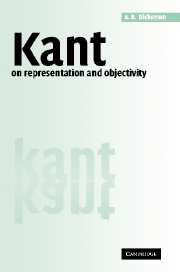1 - Representation
Published online by Cambridge University Press: 22 September 2009
Summary
As noted in the introduction, the B-Deduction is so complex that it is important to have a synoptic view of the reasoning at the heart of Kant's argument before descending into the intricacies of the text. The purpose of this first chapter is to begin providing such a synoptic view, via a discussion of Kant's notion of representation. What I am attempting to do here is to make certain conceptual connections appear as intuitive and compelling as I can. As I hope to show in the later chapters of this book, this will help to make intelligible what may otherwise appear to be a series of bewildering non sequiturs.
The notion of a representation (Vorstellung) is fundamental to Kant's epistemological theory, just as the notion of an idea is fundamental to the theories of his Cartesian and empiricist predecessors. The Critique, after all, is a text centrally concerned with what types of representations we have, how we get them, and what we do with them when we have got them. However, despite the crucial role it plays in his arguments, Kant pays little attention directly to the abstract notion of representation in general – tending to concentrate instead on more specific notions like objectivity, cognition and judgment. There is nothing in the Critique to compare, for example, with the rich material to be found in the writings of Leibniz on notions like expression and isomorphism.
- Type
- Chapter
- Information
- Kant on Representation and Objectivity , pp. 4 - 31Publisher: Cambridge University PressPrint publication year: 2003



